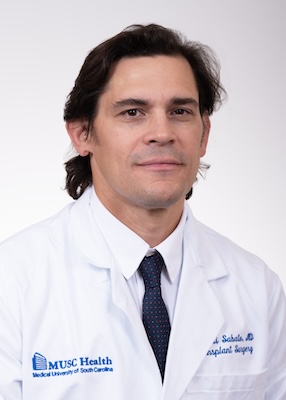
Diego di Sabato, M.D.
- Transplant Surgery
- Hepato-Pancreato-Biliary Surgery
- Liver Transplant
- Pediatric Transplant Surgery
- Charleston, SC

Being selected as a good transplant candidate is based on a thorough review of the child’s:
Before being given an “Active Status” on the United Network for Organ Sharing (UNOS) list, children will undergo an extensive medical examination of body systems and corresponding tests to determine their ability to have a transplant. Tests include:
Children are not good transplant candidates if they have:
After the evaluation, eligible patients are placed on the UNOS transplant waiting list. The MUSC Health Transplant Center’s wait times for an available liver are among the shortest in the nation. UNOS has a pre-determined process for prioritizing candidates waiting for liver transplants based on statistical formulas that are very accurate in predicting who needs a liver transplant most urgently. The MELD (Model for End Stage Liver Disease) is used for patients age 12 and older. The PELD (Pediatric End Stage Liver Disease Model) is used for patients age 11 and younger. MUSC physicians do not decide who is next to receive a liver from the transplant waiting list.
Planning for a liver transplant includes the following:
When the time comes for the liver transplant, children and families can expect:
Our goal at MUSC Transplant Center is to provide the patient and family with key information about the pre-transplant evaluation and listing process, transplant surgery and post-transplant care so the patient can make an informed decision about transplant and successfully participate in their post-transplant care.
The information will be provided before wait list placement and again before transplant surgery. Patients are asked to review and sign a Patient Acknowledgement Form, indicating they have reviewed and understand all of the key information.
After the being sent home, patients can receive monthly care here at MUSC or at our outreach clinic in Greenville. Once at home, patients increase the chances of their transplant being successful by:
Families across the state and throughout the Southeast turn to us when their children’s lives are threatened by liver disease in four major categories:
A liver transplant may also be performed to treat:
You can truly change someone’s life through living donation. If you’re interested in learning more or beginning the process of organ donation, please contact MUSC Health’s Living Donor Program at 843-792-5097 or register as a liver donor.




